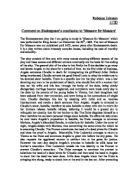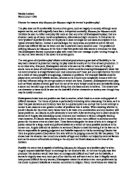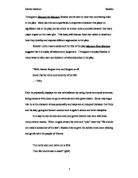Comment on Shakespeare's conclusion to 'Measure for Measure'
Rebecca Johnson 1TD Comment on Shakespeare's conclusion to 'Measure for Measure' The Shakespearean play that I am going to study is 'Measure for Measure' which was performed for King James I on December the 26th, 1604. The text of Measure For Measure was not published until 1623, seven years after Shakespeare's death. It is a play written about intensely complex issues, including the uses of morality and sexuality. The play consists of five acts with many scenes showing different aspects of the play and these scenes and different extracts eventually are the basis for the ending of the play. The general plot of the play is that firstly the Duke decides to go away and leaves Angelo in his place for a period of time. As his first order of business, Angelo sentences Claudio to death for impregnating his girlfriend Juliet. Before being imprisoned, Claudio entreats his good friend Lucio to relay his misfortune to his devoted sister Isabella. There is a specific law inn the play which was a law dooming any man to the punishment of death, who should live with a woman that was not his wife; and this law, through the lenity of the duke, being utterly disregarded, marriage became neglected, and complaints were made every day to the duke by the parents of the young ladies in Vienna, that their daughters had been seduced from their protection, and were living as the companions of
Using only act 1 of measure for measure, describe the state of Vienna at the beginning of the play. What do you think of the situation of a) the duke, b) Angelo in this act?
5th November '02 Lyndsey Paterson Measure For Measure Using only act 1 of measure for measure, describe the state of Vienna at the beginning of the play. What do you think of the situation of a) the duke, b) Angelo in this act? Although act 1 is a relatively short one, the audience is made aware of the current state of Vienna. In scene two Lucio, Gent 1 and Gent 2 discuss prostitution within Vienna. Shakespeare uses the three characters to transfer this information to the audience. We are told that several brothels situated on the outskirts of the city and have simply moved to a new location and acquired the title of 'bath house' in order to avoid closure. The jokes at the beginning of scene 2 and the re-0ccuring references to se suggest that sexual activity is an indicator as to the popularity of sex and the sex trade with the confinements of the city. When mistress Overdone arrives in the scene the point is supported further. The state of the justice system is emphasised when Angelo undertakes authority. As illustrated by Claudio's situation, we are given the information that, as with many of the laws and statutes in Vienna, the laws that have condemned Claudio to death fail to take into account the mitigating circumstances. There appears to be no logical sense to many of the
Measure for Measure-A Problem Play?
Discuss the reasons why Measure for Measure might be termed 'a problem play'. The play does not fit comfortably into any other genre, such as tragedy or comedy although some aspects can be, and will originally have been, interpreted comically. Measure for Measure could therefore be seen to reflect everyday life more so than any other of Shakespeare's plays; that is a situation made up of many moral complications, dilemmas and light moments. In this sense the term 'problem' is perfectly suited to the play as it does not single out one issue and explore it in a typical dramatic fashion, instead it acknowledges the many areas and problems within life and shows how difficult life can be when one has to deal with many issues at once. The problem of defining Measure for Measure at the time it was first performed also seems to introduce the idea that Shakespeare wanted to produce a play with more than one message or plot running through it; he may not have wanted it tied down to a certain genre. The new genre of a 'problem play' allows individual productions a great deal of flexibility in the way each character is presented making the play ideal for society at the time of each production. It is not clear who, if anyone, Shakespeare intends to be seen as the villain or hero of the play; it seems more an issue of individual interpretation, which could be showing Shakespeare's views
William Shakespeare - The Comedy of errors - Dromio concludes the play - "We came into the world like brother and brother, and now let's go hand in hand, not one before another. "What does Shakespeare mean by this? How important is this statement in relat
Heather Smith- William Shakespeare Dromio concludes the play- "We came into the world like brother and brother, and now let's go hand in hand, not one before another." What does Shakespeare mean by this? How important is this statement in relation to the whole play? William Shakespeare writes the play "The Comedy Of Errors" focussing on inequalities, by concluding with the quote by Dromio, "We came into the world like brother and brother, and now let's go hand in hand not one before another." The two brothers are now together and have regained their identity. Identity is also important throughout this play due to the witty confusion and humorous genre. This humour however is not only to entertain the audience but also to influence and affect the audience's way of thinking about the aspects covered throughout "The Comedy Of Errors" set in Elizabethan England. The title, "The Comedy of Errors" immediately introduces the genre of the play, commencing the confusion. Identity and equality are important aspects that are tackled in William Shakespeare's play writing. These aspects are presented throughout, starting in Act 1, scene 1. Shakespeare's views on inequality are presented when the character "Duke" is directed to say "Both by the syracusians and ourselves, to admit no traffic to our adverse towns." By using this view of Syracusians and Ephesians, not being allowed
Is the plot of Measure for Measure a happy one? Does act 5 make it any happier?
M.Judge 4 alpha/a Is the plot of Measure for Measure a happy one? Does act 5 make it any happier? Today 'comedy' can describe any number of productions or acts. We have a good understanding of satire, sarcasm and alternative comic methods and subversions. We are great fans of black humour and find almost anything funny if it is different and fresh. In Elizabethan times, however comedy was expected to adhere to particular traditional patterns. It usually comprised of a number of slightly manic, zany and indeed foolish characters juxtaposed with either the perfectly normal or humourless hard faced individuals who were usually mocked or taken advantage of by the other characters. The plays were usually based around a light hearted comic plot in which confusions or complexities were resolved before the end. This almost standard formula was often used by William Shakespeare. The other conventional aspects of traditional comic plots (inherited from classical Rome) involved young lovers, represented by Claudio and Juliet in Measure for Measure, who would overcome adversity to eventually marry by the final act. Although in this play Shakespeare, in Measure for Measure, deliberately uses elements of a traditional comic play but forces them together with a more serious insight into our notions of morality and indeed the questioning of law, justice and mercy. From the beginning of
Angelo, Escalus and the Duke present three kinds of ruler. How does Act I establish similarities and differences between them?
Angelo, Escalus and the Duke present three kinds of ruler. How does Act I establish similarities and differences between them? Act I sees the introduction of three important characters of the play, each taking up a different approach to authority. The Duke, Angelo and Escalus all use their power in a very different way, resulting in different consequences and effectiveness. The first position of authority we see in action is that of the Duke's. The opening scene alerts the audience to the fact that the Duke plans on leaving the city, for a reason which we are not made aware of, and that he plans on leaving Angelo in charge. As of yet, we do not know what sort of decision this is, because we do not have the substantial insight into the character of Angelo to be able to make a judgement. However, the Duke does comment on the fact that his first choice for ruler in his place was Escalus, "Old Escalus,/ Though first in question, is thy secondary." This does give the audience more an insight into the Duke's decision. It may suggest that he is weary of his choices because he didn't just go with his first instinct, he thought about it and chose a less obvious candidate. This suggests that he may have deeper meaningful reasons as to why he has not elected his most obvious replacement, causing the audience to see him perhaps as a wise character, maybe even cunning, both
Consider the Attitudes To Women Demonstrated In the Vienna of Measure For Measure.
Consider the attitudes to women demonstrated in the Vienna of Measure for Measure. I think most men have fooled themselves into thinking that they are the seat of power---because women have allowed them that dream. Women's subtle power is to make men think that the man is in charge. Eli Khamarov in America Explained! Throughout the course of Measure for Measure, Shakespeare highlights subordination of the female characters by the males. In the Vienna represented in the play women have to suffer exploitation and derogation as their individualism and independence are undermined. Shakespeare uses this treatment of women to exemplify the corruption in the city of Vienna. The two main female roles in Measure for Measure are Mariana and Isabella. Both these women are victims of the corrupt motives of the men who so strongly influence their lives. Isabella, the protagonist, is a nun. Her name means "consecrated to God". Looking at the roles the other women in the play have adopted, as will be discussed in more depth during the course of this essay, it seems she is almost forced into the role by the bigoted society in Vienna. It appears that the only fate for women, unless they wish to join a convent, be a prostitute or alone, is to become a housewife. As a nun Isabella benefits from the education and relative independence (although whether this particular
'Bear the Sword of Heaven': Does the Duke strike you as a wholly good upholder of Justice in Measure for Measure {William Shakespeare}.
'Bear the Sword of Heaven': Does the Duke strike you as a wholly good upholder of Justice in Measure for Measure {William Shakespeare} The Duke can be interpreted in a number of different ways. By the end of the play, readers have had compelling reasons for both agreeing and disagreeing with the title. How the Duke's character is construed has a crucial effect on the interpretation of the whole play. The central focus of my essay will be the various acts of punishment, reparation and forgiveness that the Duke prompts at the very end of the play. Primarily, I feel that the Duke can and has been likened to a kind of God like character who moves unseen and all seeing among his people. G.Wilson Knight suggests that the Duke is, 'lit at moments with divine suggestion comparable with his almost divine power of foreknowledge, control and wisdom.' I feel that the Duke's disguise could be because he wants to be able to dominate his people better {which conversely is not at all God like} or, which I find more creditable, because he believes that he will be able to reach the source of the problem in Vienna when he rids himself of his authoritarian appearance. Additionally, whilst reading the play it is perhaps too easy to be blinded by the Duke's godliness and overlook how human he is. He uses a very human, personal approach when dealing with the different situations. This makes
What do you find dramatically interesting about Shakespeare's presentation of the Duke in the play Measure for Measure?
What do you find dramatically interesting about Shakespeare's presentation of the Duke in the play Measure for Measure? In Measure for Measure, Shakespeare presents Duke Vincentio in the opening scene as an authoritive figure; he is highly respected and he is referred to as "My Lord". The audience immediately understands that the Duke is the central character in the play. In the very first instance the Duke's choice of words, his use of pronouns such as "we, our, government, justice and unfolds" reflects his presence and control. The Duke emerges as a problematic character for this is suggested by his searching questions regarding Angelo; "for what figure of us you think he will bear?" which raises uncertainties and questions in the mind of the audience as we speculate why he is leaving so rapidly and secretly as he will: "privy away. I love the people But do not like to stage me to their eyes" (Act I Scene ii) The play opens with the Duke deciding to appoint Angelo to govern Vienna in his absence: "For you must know, we have with a special soul Elected him our absence to supply" (Act I Scene I) The Duke makes it clear that Angelo's qualities are very obvious for all see. He thinks, "There is a kind of character in they life" which Angelo should use to the utmost. At this point the Duke seems very decisive, his authoritive role certainly takes motion here, it seems
Presentation of Escalus in Measure for Measure
Throughout Measure for Measure Escalus can be seen to have two contrasting roles in the play. Many see him as a superficial, unimportant character that plays no significant role in the play, but by others he is seen to be a crucial character that has a major impact on the main plot. This essay will discuss these two views in detail and how they develop and express different approaches to the play. Escalus' name means scales and the title of the play Measure Fore Measure suggests that it is a play of balance and judgement. Throughout the play Escalus in many ways is often seen as a byword of rational justice in the play; "Well, heaven forgive him, and forgive us all Some rise by virtue and some by virtue fall ..." P21) Here he physically displays his role of a balancer by using rhyme and equal sentences, being someone who does not go to extremes and who gives reason. Some may argue that he is the character whose personality and ways are at mid-point between the Duke and his easy going and lenient conduct and Angelo's severe and strict discipline. In a way he can be seen as a kind and gentle hearted man who will show mercy where needed. When Angelo shows his strict and "cold" view that "We should not make a scarecrow of the law", Escalus tries to give him advise to be more yielding and gentle with the people of Vienna; "Let us be keen and rather cut a little Then











